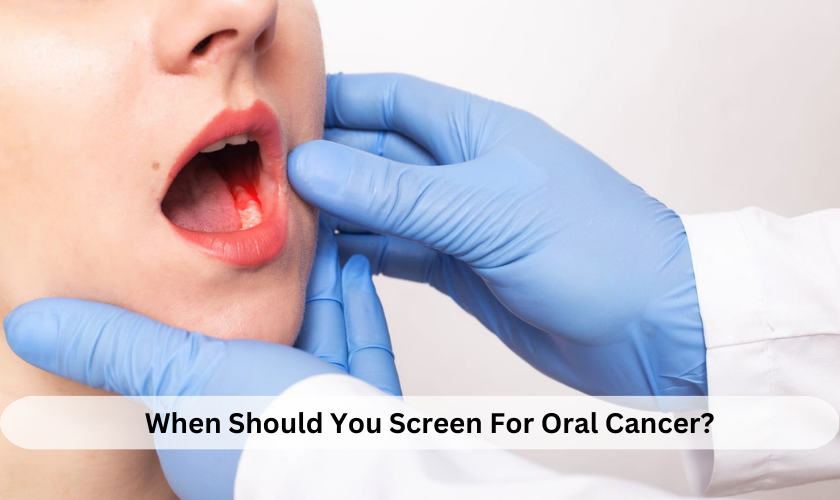
When Should You Screen For Oral Cancer?
Oral cancer is a serious health concern that can have deadly consequences if it is not identified and treated in time. It is important to know when to screen for it so that you can catch it before the symptoms become too severe. In this blog post, we will discuss when you should screen for oral cancer and how doing so could help save your life.
It involves abnormal growths in the mouth, lips, tongue or throat which can be difficult to detect without screening. It accounts for more than 30,000 cases each year in the United States alone, with the American Cancer Society estimating that over 10,000 deaths occur annually due to this disease. Fortunately, early detection and treatment of oral cancer is possible when screening is done at the right time.
What Is Oral Cancer?
It is a type of cancer that affects the lips, tongue, throat or other parts of the mouth. It can affect men and women of any age and is often linked to lifestyle choices such as smoking, drinking alcohol or using chewing tobacco. Oral cancer cells start to grow uncontrollably and can quickly spread to other areas if left untreated. Early detection and treatment are crucial in order to prevent serious complications or death from this disease.
Symptoms Of Oral Cancer
The symptoms of oral cancer vary depending on where it develops, however some common signs include lumps or bumps on the gums or tongue, sores that do not heal, pain or tenderness in the mouth and throat, difficulty swallowing, hoarseness of the voice or a feeling of something stuck in the throat.
Who Is At Risk?
Anyone can get oral cancer regardless of age or gender. However, there are certain factors which make some people more likely to develop it than others. These include smoking, drinking alcohol regularly and being exposed to high levels of sunlight. It is also more common among people who have pre-existing medical conditions such as HIV/AIDS or diabetes.
How Can I Reduce My Risk?
The most important thing you can do to reduce your risk of developing that is to quit smoking and limit your alcohol intake. Additionally, you can protect yourself from the sun’s UV rays by wearing sunscreen or protective clothing when outdoors. Being mindful of what you eat and avoiding processed foods can also help reduce your risk.
When Should You Screen For Oral Cancer?
It is important to get regular screenings for it in order to detect any suspicious growths early on. Generally speaking, adults should be screened at least once a year by their dentist or primary care physician. Those with a higher risk of developing oral cancer due to lifestyle choices or underlying medical conditions may need more frequent screenings.
Oral Cancer Exams
Oral cancer exams are quick and painless procedures that involve checking for any abnormalities in the mouth or throat. During an exam, your healthcare provider will look for any lumps or bumps, as well as changes in the coloration of the tissues inside your mouth. They may also take a biopsy to further analyze any suspicious growths.
Oral Pathology Testing
Oral pathology testing is used to determine whether a tissue sample contains cancer cells or not. This type of test can be done quickly and accurately, allowing for timely treatment if it is detected. Oral pathology tests are non-invasive and relatively inexpensive, making them a great option for those looking to get screened for oral cancer.
Advanced Imaging Techniques
Advanced imaging techniques such as CT scans and MRI scans can be used to detect it in its early stages. These tests are more expensive than other methods, however, they provide detailed images of the inside of your mouth, enabling doctors to accurately diagnose and treat any abnormalities.
Conclusion:
It is a serious disease that can have devastating consequences if left untreated. That’s why it’s vital to get regular screenings for this condition in order to catch any potential signs early on. There are several different screening options available, so talk to your healthcare provider about which one is right for you.
FAQs:
1. How often should I get an oral cancer screening?
Answer: Generally speaking, adults should get an screening at least once a year. However, those with higher risk factors may need more frequent screenings.
2. What is an oral pathology test?
Answer: Oral pathology tests are used to determine whether tissue samples contain cancer cells or not. This type of test usually involves taking a biopsy and analyzing it under a microscope.
3. Are advanced imaging techniques necessary for detecting oral cancer?
Answer: Advanced imaging techniques such as CT scans and MRI scans can be useful in detecting early signs of it, however they are typically only recommended if other screening methods have come back inconclusive or if the healthcare provider suspects something more serious is going on.
